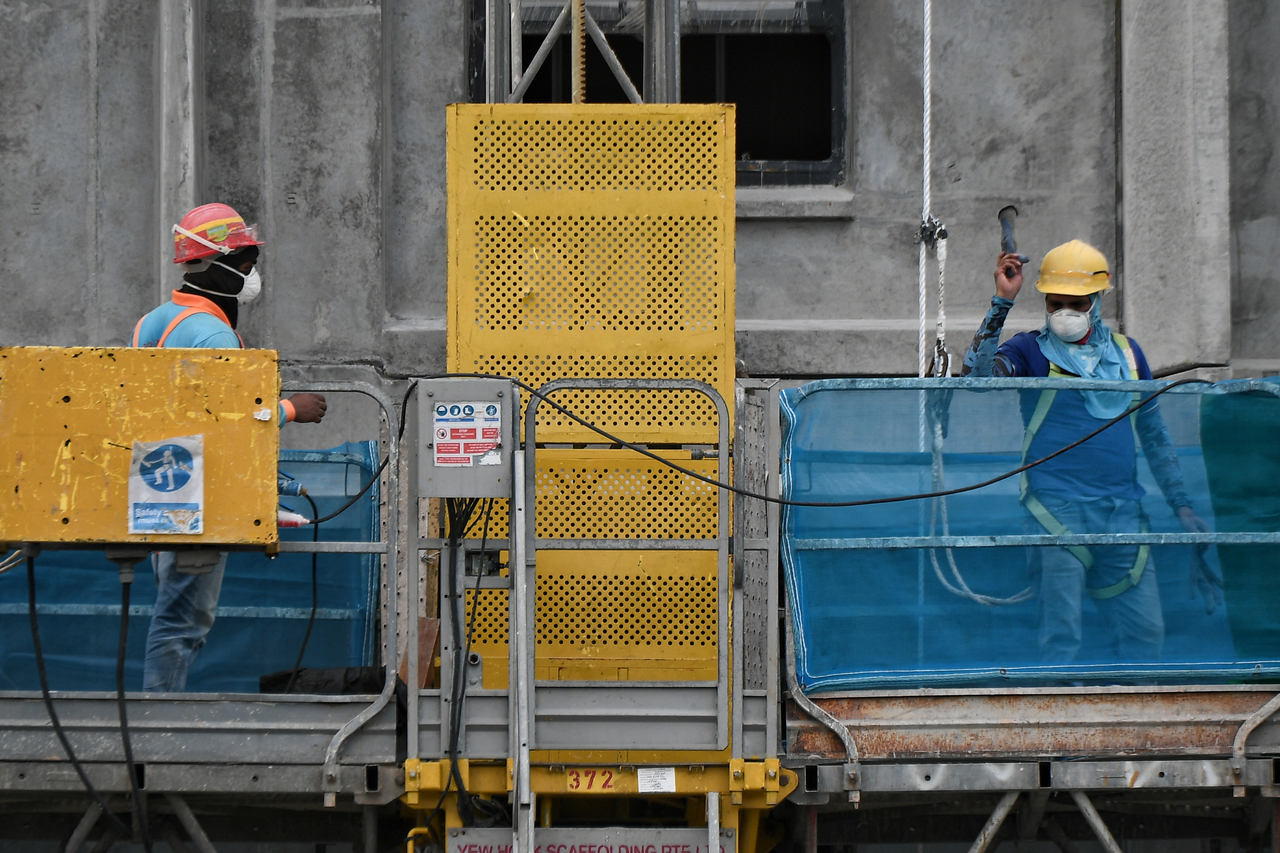Workplace safety officers to get govt support as their role more critical now: Zaqy
Sign up now: Get ST's newsletters delivered to your inbox

Workplace injury rates have returned to pre-pandemic levels and there have been at least 32 workplace deaths this year.
ST PHOTO: KUA CHEE SIONG
SINGAPORE - When news of a virus outbreak in Wuhan broke early last year, Ms Christina Chua had to dust off the old protocols that her firm had used during the Sars epidemic in 2003.
With little information to go on about the new disease, the health, safety and environment manager at manufacturer Cameron Singapore relied on past experience to ensure that her workplace was safe, implementing temperature screening and other controls even before safe management measures were adopted.
She spent nights navigating new border restrictions to ensure that workers could return here to work, and came up with new protocols for the ever-evolving Covid-19 rules.
This was all on top of her usual work of making sure her firm was accident-free.
"That was a very big struggle, managing the pandemic and also safety," the 47-year-old told The Straits Times.
She credited the support of her management and robust systems that were already in place for making things a bit easier.
The pandemic has forced safety officers such as Ms Chua to think of new standard operating procedures and take on more responsibilities than they normally would.
Speaking at a conference on Wednesday (Nov 10), Senior Minister of State for Manpower Zaqy Mohamad said these officers have become even more critical now than before, especially since businesses must address new risks, such as infectious disease outbreaks, mental health and terrorism, in the new normal.
The conference was a hybrid one held at the Devan Nair Institute for Employment and Employability and over videoconferencing platform Zoom.
The Workplace Safety and Health (WSH) Council has revised its risk management code of practice to include these new risks, and more is being done to train safety officers to be future-ready.
But Mr Zaqy also acknowledged that many safety officers have struggled to cope with their additional roles.
He said the Ministry of Manpower (MOM) has received "frank feedback" that the past two years have been challenging for safety officers juggling the prevention of accidents and the prevention of Covid-19 transmission.
Those who are not given more resources and support have had it even worse.
Mr Zaqy said: "For companies to manage both injury and Covid-19 prevention well, they need to acknowledge the valuable role of WSHOs (workplace safety and health officers) and equip them with the proper resources and skills... These cannot be only the WSHOs' responsibility. They are the entire company's responsibility."
Observers have previously raised fears that safety is being compromised at worksites due to the disruptions and manpower crunch brought about by Covid-19.
Workplace injury rates have returned to pre-pandemic levels, and there have been at least 32 workplace deaths this year, more than the 30 deaths recorded last year.
Mr Zaqy said the Government will do its part to support safety officers.
The risk management code of practice, which gives advice on regulatory obligations and the implementation of risk controls, will include examples of how to identify, evaluate and manage risks related to infectious diseases, mental health and terrorism.
The curriculum for the nationally recognised BizSafe programme will also include these new risks.
In the coming months, MOM inspectors will look out for these new elements and advise companies on how to incorporate them if they are absent from their risk assessment processes, said Mr Zaqy.
The WSH Council said Covid-19 has not only reinforced the need to mitigate infectious disease transmission, but also the growing risk to workers' mental well-being.
As for terrorism, while there has not been any significant trends recently, such threats continue to be "real and present", said the council.
Hence, risk management processes must be kept relevant to address them, it said.
Meanwhile, MOM is working with the Singapore Institution of Safety Officers (Siso) to recognise more training courses to support professional development.
Siso and the Employment and Employability Institute will also create the first jobs portal dedicated to safety officers. It will be launched next February.
A career development plan for safety officers is also in the works, to help provide a structured career progression pathway and attract more locals to the sector.
Said Siso vice-president Darajit Daud: "As we learnt from the Covid-19 pandemic... crisis management has taken on new meaning, and integrating occupational health and well-being has become vital for successful businesses in the new norm."
He added: "WSH officers will need to shoulder a new level of responsibility."


